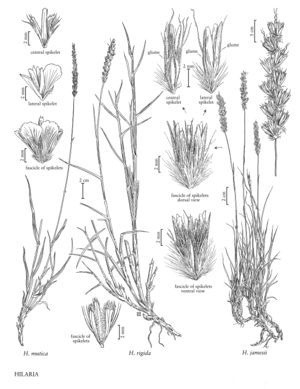Difference between revisions of "Hilaria jamesii"
FNA>Volume Importer |
FNA>Volume Importer |
||
| Line 7: | Line 7: | ||
|synonyms={{Treatment/ID/Synonym | |synonyms={{Treatment/ID/Synonym | ||
|name=Pleuraphis jamesii | |name=Pleuraphis jamesii | ||
| − | |authority= | + | |authority= |
| + | |rank=species | ||
}} | }} | ||
|hierarchy=Poaceae;Poaceae subfam. Chloridoideae;Poaceae tribe Cynodonteae;Hilaria;Hilaria jamesii | |hierarchy=Poaceae;Poaceae subfam. Chloridoideae;Poaceae tribe Cynodonteae;Hilaria;Hilaria jamesii | ||
| Line 19: | Line 20: | ||
-->{{Treatment/Body | -->{{Treatment/Body | ||
| − | |discussion=<p>Hilaria jamesii is endemic to the southwestern United States, and grows in deserts, canyons, and dry plains. It has medium grazing value but low palatability. It is usually less pubescent than H. rigida, the difference being most marked on the lower cauline nodes.</p> | + | |discussion=<p><i>Hilaria jamesii</i> is endemic to the southwestern United States, and grows in deserts, canyons, and dry plains. It has medium grazing value but low palatability. It is usually less pubescent than <i>H. rigida</i>, the difference being most marked on the lower cauline nodes.</p> |
|tables= | |tables= | ||
|references= | |references= | ||
| Line 28: | Line 29: | ||
-->{{#Taxon: | -->{{#Taxon: | ||
name=Hilaria jamesii | name=Hilaria jamesii | ||
| − | |||
|authority=(Torr.) Benth. | |authority=(Torr.) Benth. | ||
|rank=species | |rank=species | ||
| Line 35: | Line 35: | ||
|basionyms= | |basionyms= | ||
|family=Poaceae | |family=Poaceae | ||
| − | |illustrator=Linda A. Vorobik | + | |illustrator=Linda A. Vorobik;Karen Klitz |
| + | |illustration copyright=Utah State University | ||
|reference=None | |reference=None | ||
|publication title= | |publication title= | ||
|publication year= | |publication year= | ||
|special status= | |special status= | ||
| − | |source xml=https:// | + | |source xml=https://jpend@bitbucket.org/aafc-mbb/fna-data-curation.git/src/f50eec43f223ca0e34566be0b046453a0960e173/coarse_grained_fna_xml/V25/V25_916.xml |
|subfamily=Poaceae subfam. Chloridoideae | |subfamily=Poaceae subfam. Chloridoideae | ||
|tribe=Poaceae tribe Cynodonteae | |tribe=Poaceae tribe Cynodonteae | ||
Revision as of 20:38, 16 December 2019
Plants perennial; strongly rhizomatous or stoloniferous. Culms 20-65 cm, erect, bases much branched; nodes usually pilose or villous, sometimes glabrous; lower internodes glabrous. Sheaths glabrous, sometimes slightly scabrous; collars pilose at the edges; ligules 1.5-5 mm, often laciniate; blades 2-20 cm long, 2-4 mm wide, involute and curled when dry, sparsely villous behind the ligules, abaxial surfaces scabridulous, adaxial surfaces scabrous. Panicles 2-6 cm; fascicles 6-8 mm. Lateral spikelets with 3 staminate florets; glumes thin, membranous, lanceolate or parallel-sided, not conspicuously fused at the base, apices acute to rounded, often ciliate, veins rarely excurrent; lower glumes dorsally awned, awns exceeding the apices; anthers 3, about 5 mm. Central spikelets with 1 bisexual floret; glumes with excurrent veins forming distinct awns; lemmas exceeding the glumes, ciliate, the midveins sometimes excurrent. 2n = 18, 36.
Discussion
Hilaria jamesii is endemic to the southwestern United States, and grows in deserts, canyons, and dry plains. It has medium grazing value but low palatability. It is usually less pubescent than H. rigida, the difference being most marked on the lower cauline nodes.
Selected References
None.
